Feature Article: Corporate Social Thought and Community in UNCC100
VerifiedAdded on 2022/09/14
|6
|1679
|13
Essay
AI Summary
This feature article explores the principles of Catholic Social Thought (CST), focusing on how these principles shape the development of the self and the idea of community. The article examines five key principles: Respect for the Human Person, Preferential Options for the Poor and Vulnerable, Solidarity, Subsidiarity, and the Common Good. It explains each principle's core ideas and their significance. Respect for the Human Person emphasizes human dignity and the right to life. Preferential options highlight the need to prioritize the marginalized. Solidarity stresses the importance of caring for all members of the community. Subsidiarity discusses the balance of support within a community. The Common Good emphasizes the importance of prioritizing the collective well-being over individual gain. The article argues that understanding and practicing these principles leads to a deeper understanding of the self and its role in the community, emphasizing the interconnectedness of individuals within a larger social framework. The article concludes by highlighting how governments and educational institutions can use these principles to create a better society.
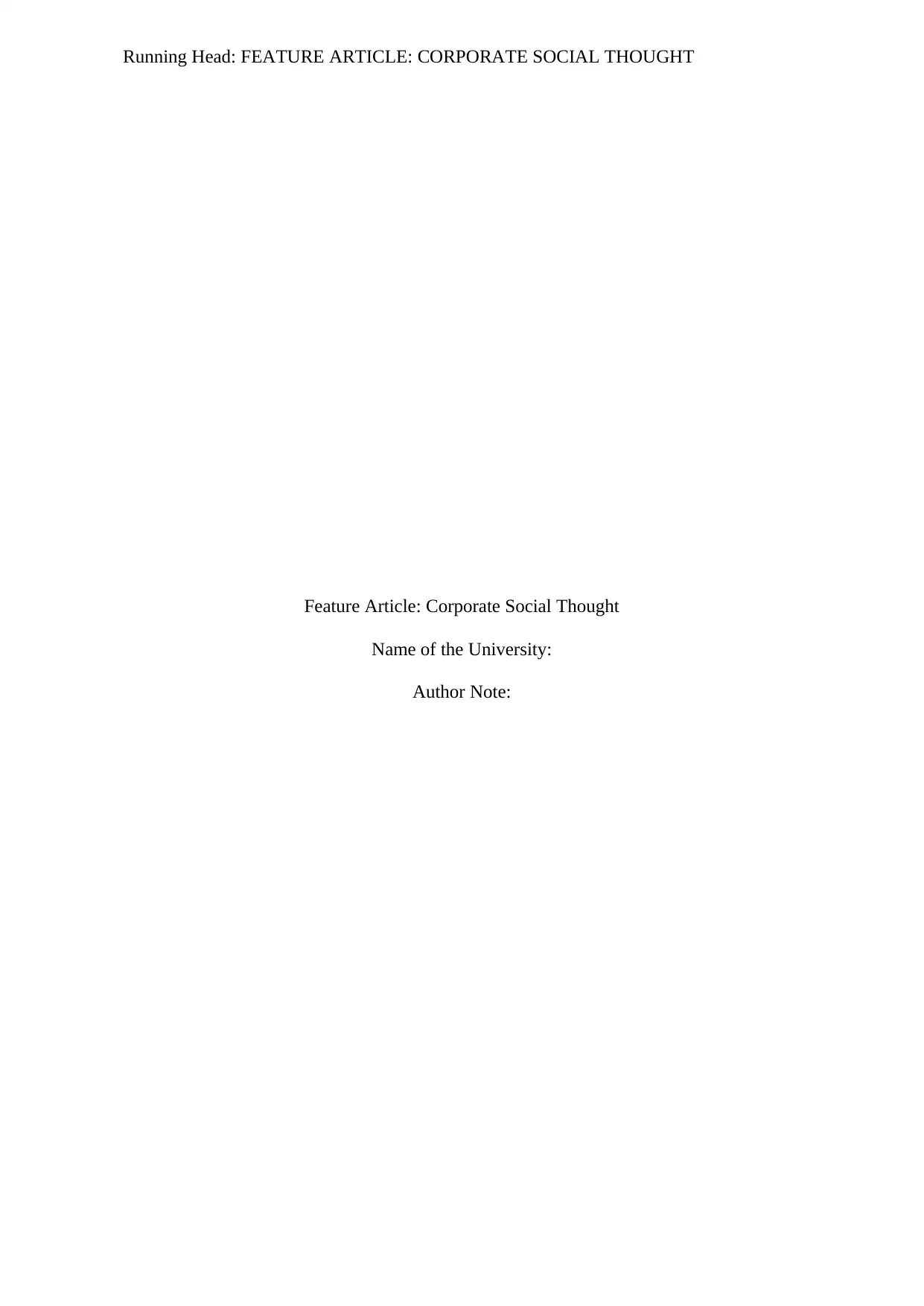
Running Head: FEATURE ARTICLE: CORPORATE SOCIAL THOUGHT
Feature Article: Corporate Social Thought
Name of the University:
Author Note:
Feature Article: Corporate Social Thought
Name of the University:
Author Note:
Paraphrase This Document
Need a fresh take? Get an instant paraphrase of this document with our AI Paraphraser
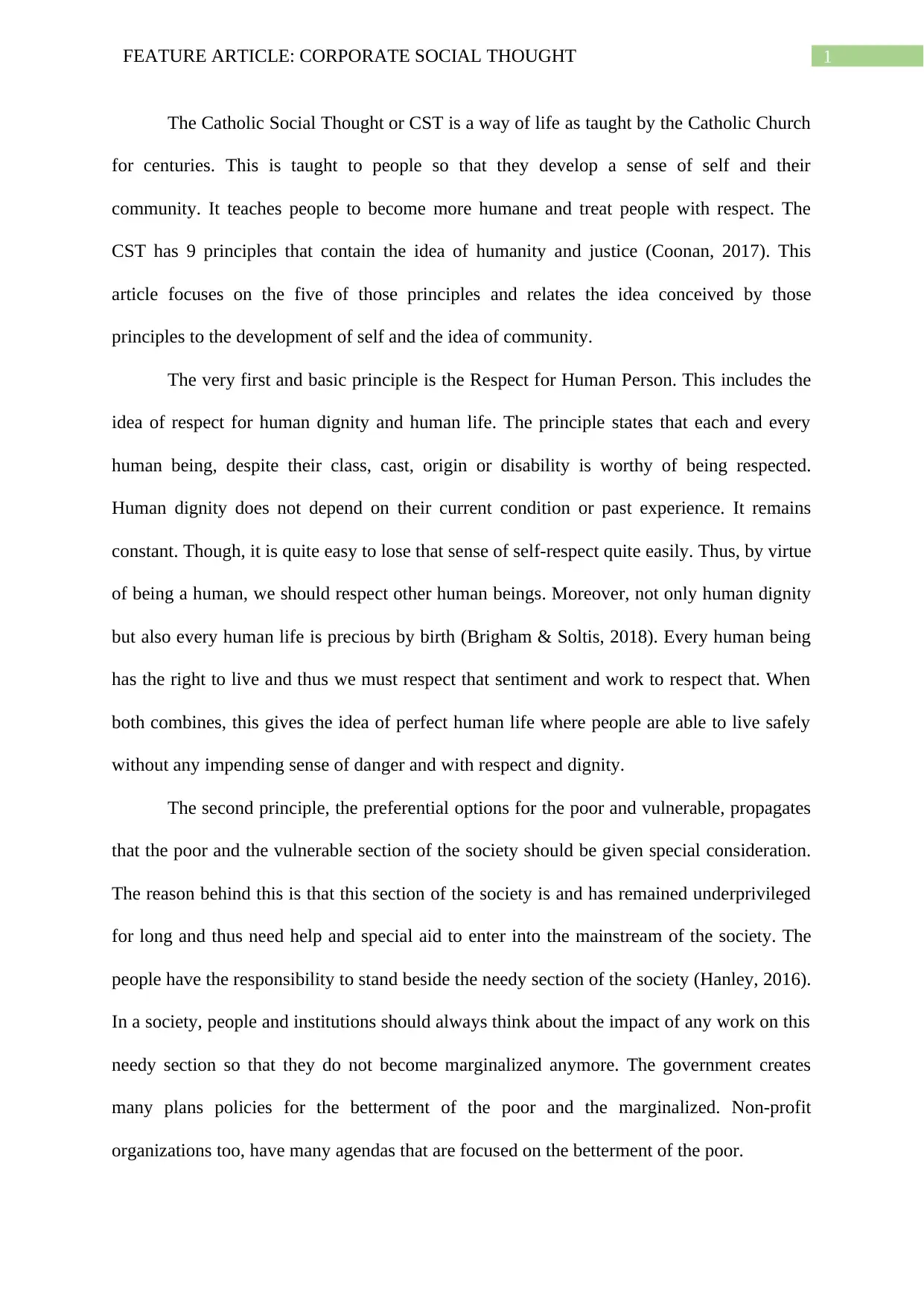
1FEATURE ARTICLE: CORPORATE SOCIAL THOUGHT
The Catholic Social Thought or CST is a way of life as taught by the Catholic Church
for centuries. This is taught to people so that they develop a sense of self and their
community. It teaches people to become more humane and treat people with respect. The
CST has 9 principles that contain the idea of humanity and justice (Coonan, 2017). This
article focuses on the five of those principles and relates the idea conceived by those
principles to the development of self and the idea of community.
The very first and basic principle is the Respect for Human Person. This includes the
idea of respect for human dignity and human life. The principle states that each and every
human being, despite their class, cast, origin or disability is worthy of being respected.
Human dignity does not depend on their current condition or past experience. It remains
constant. Though, it is quite easy to lose that sense of self-respect quite easily. Thus, by virtue
of being a human, we should respect other human beings. Moreover, not only human dignity
but also every human life is precious by birth (Brigham & Soltis, 2018). Every human being
has the right to live and thus we must respect that sentiment and work to respect that. When
both combines, this gives the idea of perfect human life where people are able to live safely
without any impending sense of danger and with respect and dignity.
The second principle, the preferential options for the poor and vulnerable, propagates
that the poor and the vulnerable section of the society should be given special consideration.
The reason behind this is that this section of the society is and has remained underprivileged
for long and thus need help and special aid to enter into the mainstream of the society. The
people have the responsibility to stand beside the needy section of the society (Hanley, 2016).
In a society, people and institutions should always think about the impact of any work on this
needy section so that they do not become marginalized anymore. The government creates
many plans policies for the betterment of the poor and the marginalized. Non-profit
organizations too, have many agendas that are focused on the betterment of the poor.
The Catholic Social Thought or CST is a way of life as taught by the Catholic Church
for centuries. This is taught to people so that they develop a sense of self and their
community. It teaches people to become more humane and treat people with respect. The
CST has 9 principles that contain the idea of humanity and justice (Coonan, 2017). This
article focuses on the five of those principles and relates the idea conceived by those
principles to the development of self and the idea of community.
The very first and basic principle is the Respect for Human Person. This includes the
idea of respect for human dignity and human life. The principle states that each and every
human being, despite their class, cast, origin or disability is worthy of being respected.
Human dignity does not depend on their current condition or past experience. It remains
constant. Though, it is quite easy to lose that sense of self-respect quite easily. Thus, by virtue
of being a human, we should respect other human beings. Moreover, not only human dignity
but also every human life is precious by birth (Brigham & Soltis, 2018). Every human being
has the right to live and thus we must respect that sentiment and work to respect that. When
both combines, this gives the idea of perfect human life where people are able to live safely
without any impending sense of danger and with respect and dignity.
The second principle, the preferential options for the poor and vulnerable, propagates
that the poor and the vulnerable section of the society should be given special consideration.
The reason behind this is that this section of the society is and has remained underprivileged
for long and thus need help and special aid to enter into the mainstream of the society. The
people have the responsibility to stand beside the needy section of the society (Hanley, 2016).
In a society, people and institutions should always think about the impact of any work on this
needy section so that they do not become marginalized anymore. The government creates
many plans policies for the betterment of the poor and the marginalized. Non-profit
organizations too, have many agendas that are focused on the betterment of the poor.
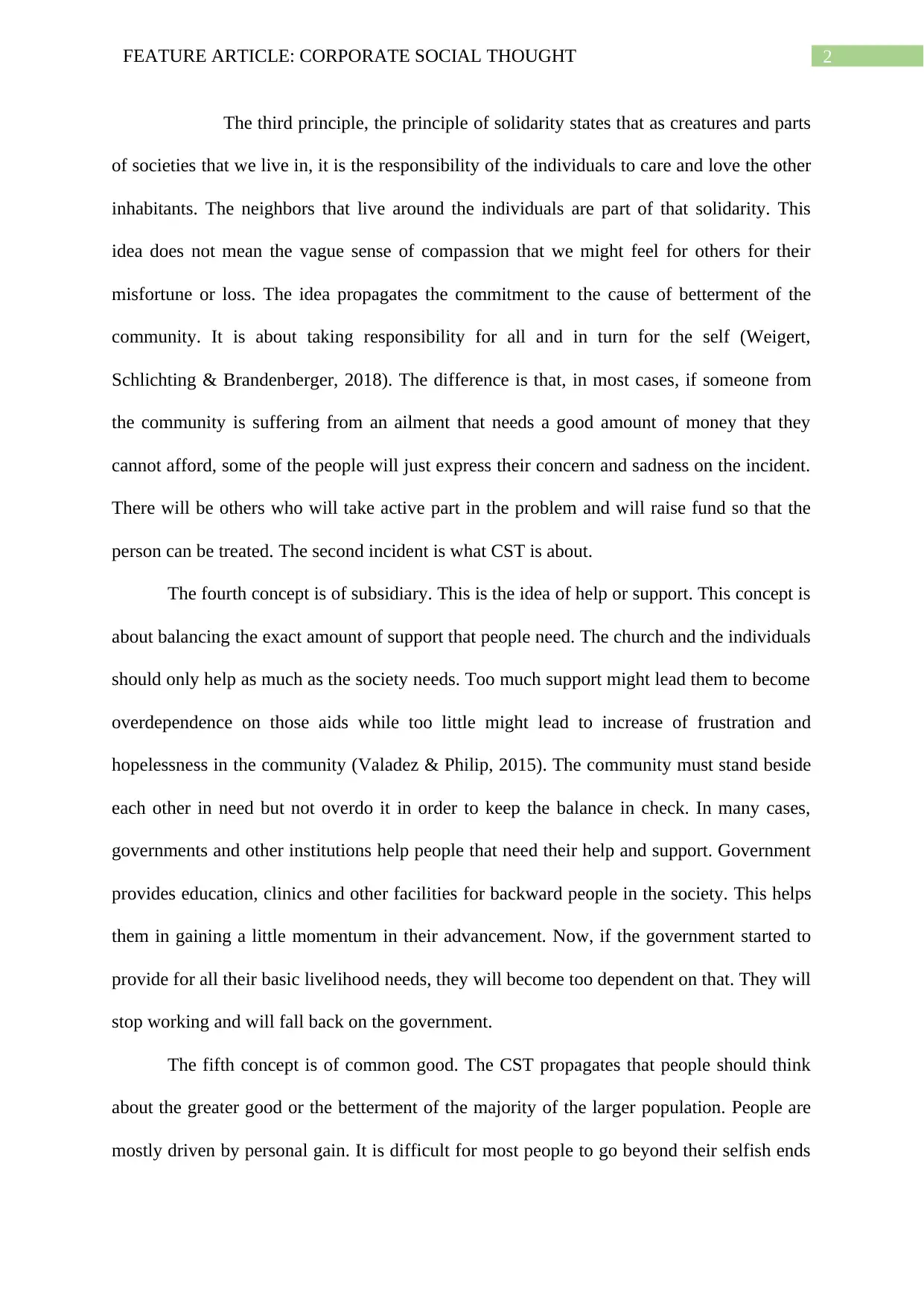
2FEATURE ARTICLE: CORPORATE SOCIAL THOUGHT
The third principle, the principle of solidarity states that as creatures and parts
of societies that we live in, it is the responsibility of the individuals to care and love the other
inhabitants. The neighbors that live around the individuals are part of that solidarity. This
idea does not mean the vague sense of compassion that we might feel for others for their
misfortune or loss. The idea propagates the commitment to the cause of betterment of the
community. It is about taking responsibility for all and in turn for the self (Weigert,
Schlichting & Brandenberger, 2018). The difference is that, in most cases, if someone from
the community is suffering from an ailment that needs a good amount of money that they
cannot afford, some of the people will just express their concern and sadness on the incident.
There will be others who will take active part in the problem and will raise fund so that the
person can be treated. The second incident is what CST is about.
The fourth concept is of subsidiary. This is the idea of help or support. This concept is
about balancing the exact amount of support that people need. The church and the individuals
should only help as much as the society needs. Too much support might lead them to become
overdependence on those aids while too little might lead to increase of frustration and
hopelessness in the community (Valadez & Philip, 2015). The community must stand beside
each other in need but not overdo it in order to keep the balance in check. In many cases,
governments and other institutions help people that need their help and support. Government
provides education, clinics and other facilities for backward people in the society. This helps
them in gaining a little momentum in their advancement. Now, if the government started to
provide for all their basic livelihood needs, they will become too dependent on that. They will
stop working and will fall back on the government.
The fifth concept is of common good. The CST propagates that people should think
about the greater good or the betterment of the majority of the larger population. People are
mostly driven by personal gain. It is difficult for most people to go beyond their selfish ends
The third principle, the principle of solidarity states that as creatures and parts
of societies that we live in, it is the responsibility of the individuals to care and love the other
inhabitants. The neighbors that live around the individuals are part of that solidarity. This
idea does not mean the vague sense of compassion that we might feel for others for their
misfortune or loss. The idea propagates the commitment to the cause of betterment of the
community. It is about taking responsibility for all and in turn for the self (Weigert,
Schlichting & Brandenberger, 2018). The difference is that, in most cases, if someone from
the community is suffering from an ailment that needs a good amount of money that they
cannot afford, some of the people will just express their concern and sadness on the incident.
There will be others who will take active part in the problem and will raise fund so that the
person can be treated. The second incident is what CST is about.
The fourth concept is of subsidiary. This is the idea of help or support. This concept is
about balancing the exact amount of support that people need. The church and the individuals
should only help as much as the society needs. Too much support might lead them to become
overdependence on those aids while too little might lead to increase of frustration and
hopelessness in the community (Valadez & Philip, 2015). The community must stand beside
each other in need but not overdo it in order to keep the balance in check. In many cases,
governments and other institutions help people that need their help and support. Government
provides education, clinics and other facilities for backward people in the society. This helps
them in gaining a little momentum in their advancement. Now, if the government started to
provide for all their basic livelihood needs, they will become too dependent on that. They will
stop working and will fall back on the government.
The fifth concept is of common good. The CST propagates that people should think
about the greater good or the betterment of the majority of the larger population. People are
mostly driven by personal gain. It is difficult for most people to go beyond their selfish ends
⊘ This is a preview!⊘
Do you want full access?
Subscribe today to unlock all pages.

Trusted by 1+ million students worldwide
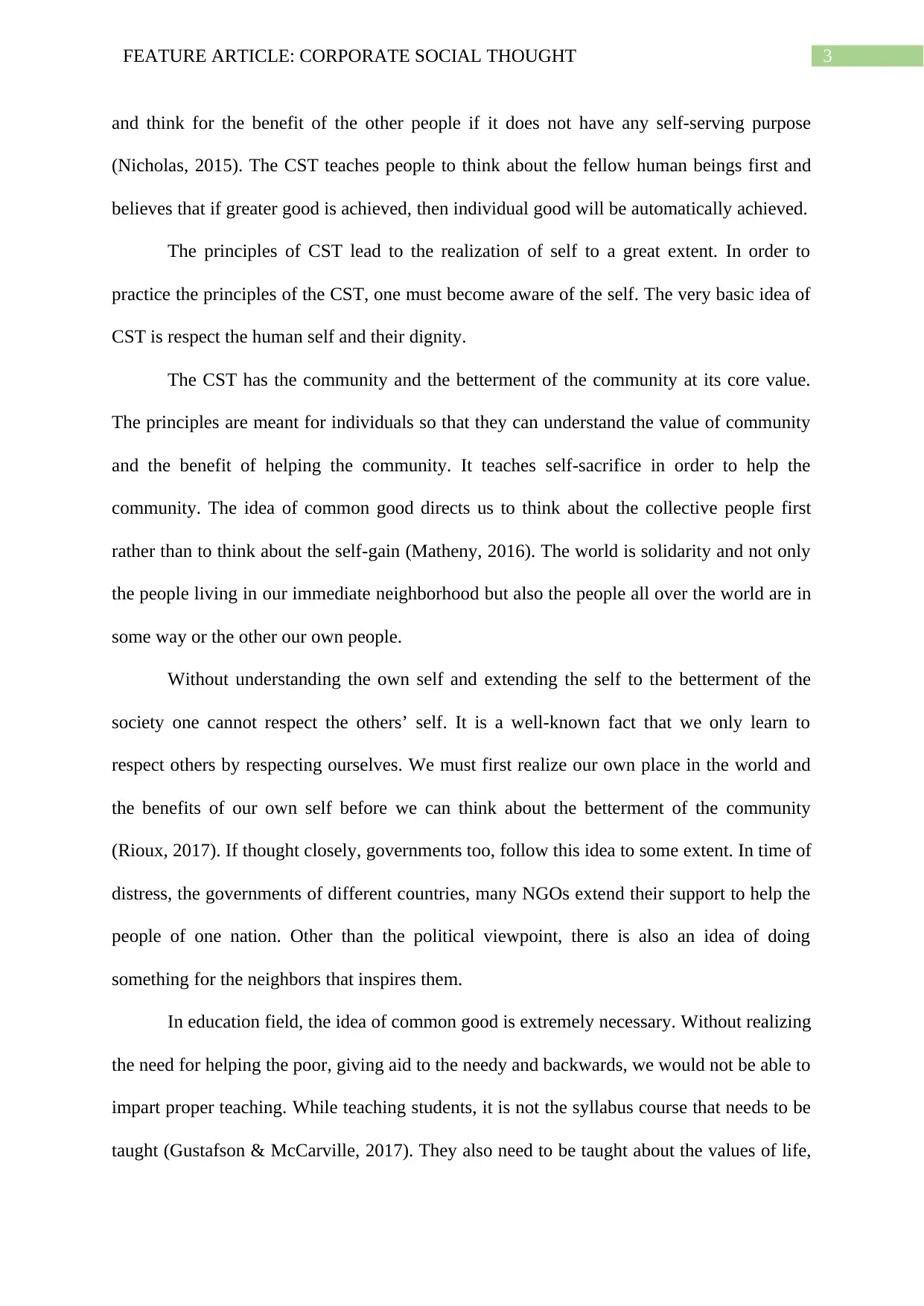
3FEATURE ARTICLE: CORPORATE SOCIAL THOUGHT
and think for the benefit of the other people if it does not have any self-serving purpose
(Nicholas, 2015). The CST teaches people to think about the fellow human beings first and
believes that if greater good is achieved, then individual good will be automatically achieved.
The principles of CST lead to the realization of self to a great extent. In order to
practice the principles of the CST, one must become aware of the self. The very basic idea of
CST is respect the human self and their dignity.
The CST has the community and the betterment of the community at its core value.
The principles are meant for individuals so that they can understand the value of community
and the benefit of helping the community. It teaches self-sacrifice in order to help the
community. The idea of common good directs us to think about the collective people first
rather than to think about the self-gain (Matheny, 2016). The world is solidarity and not only
the people living in our immediate neighborhood but also the people all over the world are in
some way or the other our own people.
Without understanding the own self and extending the self to the betterment of the
society one cannot respect the others’ self. It is a well-known fact that we only learn to
respect others by respecting ourselves. We must first realize our own place in the world and
the benefits of our own self before we can think about the betterment of the community
(Rioux, 2017). If thought closely, governments too, follow this idea to some extent. In time of
distress, the governments of different countries, many NGOs extend their support to help the
people of one nation. Other than the political viewpoint, there is also an idea of doing
something for the neighbors that inspires them.
In education field, the idea of common good is extremely necessary. Without realizing
the need for helping the poor, giving aid to the needy and backwards, we would not be able to
impart proper teaching. While teaching students, it is not the syllabus course that needs to be
taught (Gustafson & McCarville, 2017). They also need to be taught about the values of life,
and think for the benefit of the other people if it does not have any self-serving purpose
(Nicholas, 2015). The CST teaches people to think about the fellow human beings first and
believes that if greater good is achieved, then individual good will be automatically achieved.
The principles of CST lead to the realization of self to a great extent. In order to
practice the principles of the CST, one must become aware of the self. The very basic idea of
CST is respect the human self and their dignity.
The CST has the community and the betterment of the community at its core value.
The principles are meant for individuals so that they can understand the value of community
and the benefit of helping the community. It teaches self-sacrifice in order to help the
community. The idea of common good directs us to think about the collective people first
rather than to think about the self-gain (Matheny, 2016). The world is solidarity and not only
the people living in our immediate neighborhood but also the people all over the world are in
some way or the other our own people.
Without understanding the own self and extending the self to the betterment of the
society one cannot respect the others’ self. It is a well-known fact that we only learn to
respect others by respecting ourselves. We must first realize our own place in the world and
the benefits of our own self before we can think about the betterment of the community
(Rioux, 2017). If thought closely, governments too, follow this idea to some extent. In time of
distress, the governments of different countries, many NGOs extend their support to help the
people of one nation. Other than the political viewpoint, there is also an idea of doing
something for the neighbors that inspires them.
In education field, the idea of common good is extremely necessary. Without realizing
the need for helping the poor, giving aid to the needy and backwards, we would not be able to
impart proper teaching. While teaching students, it is not the syllabus course that needs to be
taught (Gustafson & McCarville, 2017). They also need to be taught about the values of life,
Paraphrase This Document
Need a fresh take? Get an instant paraphrase of this document with our AI Paraphraser

4FEATURE ARTICLE: CORPORATE SOCIAL THOUGHT
respecting others and helping other people in need so that they can contribute to creation of a
better world in future. Thus, it is our responsibility to help them understand that and CST will
help us realize that.
respecting others and helping other people in need so that they can contribute to creation of a
better world in future. Thus, it is our responsibility to help them understand that and CST will
help us realize that.
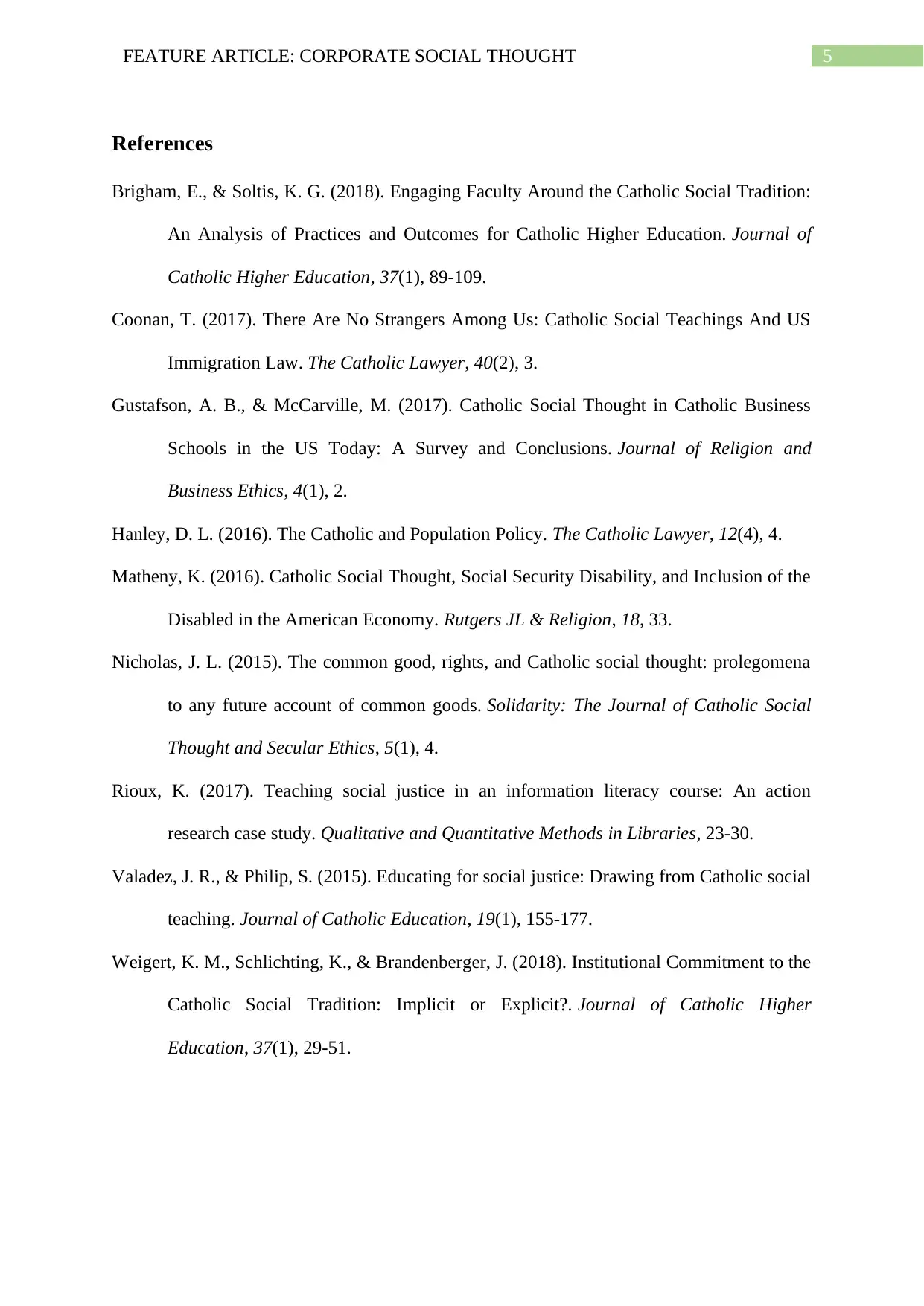
5FEATURE ARTICLE: CORPORATE SOCIAL THOUGHT
References
Brigham, E., & Soltis, K. G. (2018). Engaging Faculty Around the Catholic Social Tradition:
An Analysis of Practices and Outcomes for Catholic Higher Education. Journal of
Catholic Higher Education, 37(1), 89-109.
Coonan, T. (2017). There Are No Strangers Among Us: Catholic Social Teachings And US
Immigration Law. The Catholic Lawyer, 40(2), 3.
Gustafson, A. B., & McCarville, M. (2017). Catholic Social Thought in Catholic Business
Schools in the US Today: A Survey and Conclusions. Journal of Religion and
Business Ethics, 4(1), 2.
Hanley, D. L. (2016). The Catholic and Population Policy. The Catholic Lawyer, 12(4), 4.
Matheny, K. (2016). Catholic Social Thought, Social Security Disability, and Inclusion of the
Disabled in the American Economy. Rutgers JL & Religion, 18, 33.
Nicholas, J. L. (2015). The common good, rights, and Catholic social thought: prolegomena
to any future account of common goods. Solidarity: The Journal of Catholic Social
Thought and Secular Ethics, 5(1), 4.
Rioux, K. (2017). Teaching social justice in an information literacy course: An action
research case study. Qualitative and Quantitative Methods in Libraries, 23-30.
Valadez, J. R., & Philip, S. (2015). Educating for social justice: Drawing from Catholic social
teaching. Journal of Catholic Education, 19(1), 155-177.
Weigert, K. M., Schlichting, K., & Brandenberger, J. (2018). Institutional Commitment to the
Catholic Social Tradition: Implicit or Explicit?. Journal of Catholic Higher
Education, 37(1), 29-51.
References
Brigham, E., & Soltis, K. G. (2018). Engaging Faculty Around the Catholic Social Tradition:
An Analysis of Practices and Outcomes for Catholic Higher Education. Journal of
Catholic Higher Education, 37(1), 89-109.
Coonan, T. (2017). There Are No Strangers Among Us: Catholic Social Teachings And US
Immigration Law. The Catholic Lawyer, 40(2), 3.
Gustafson, A. B., & McCarville, M. (2017). Catholic Social Thought in Catholic Business
Schools in the US Today: A Survey and Conclusions. Journal of Religion and
Business Ethics, 4(1), 2.
Hanley, D. L. (2016). The Catholic and Population Policy. The Catholic Lawyer, 12(4), 4.
Matheny, K. (2016). Catholic Social Thought, Social Security Disability, and Inclusion of the
Disabled in the American Economy. Rutgers JL & Religion, 18, 33.
Nicholas, J. L. (2015). The common good, rights, and Catholic social thought: prolegomena
to any future account of common goods. Solidarity: The Journal of Catholic Social
Thought and Secular Ethics, 5(1), 4.
Rioux, K. (2017). Teaching social justice in an information literacy course: An action
research case study. Qualitative and Quantitative Methods in Libraries, 23-30.
Valadez, J. R., & Philip, S. (2015). Educating for social justice: Drawing from Catholic social
teaching. Journal of Catholic Education, 19(1), 155-177.
Weigert, K. M., Schlichting, K., & Brandenberger, J. (2018). Institutional Commitment to the
Catholic Social Tradition: Implicit or Explicit?. Journal of Catholic Higher
Education, 37(1), 29-51.
⊘ This is a preview!⊘
Do you want full access?
Subscribe today to unlock all pages.

Trusted by 1+ million students worldwide
1 out of 6
Related Documents
Your All-in-One AI-Powered Toolkit for Academic Success.
+13062052269
info@desklib.com
Available 24*7 on WhatsApp / Email
![[object Object]](/_next/static/media/star-bottom.7253800d.svg)
Unlock your academic potential
Copyright © 2020–2026 A2Z Services. All Rights Reserved. Developed and managed by ZUCOL.


